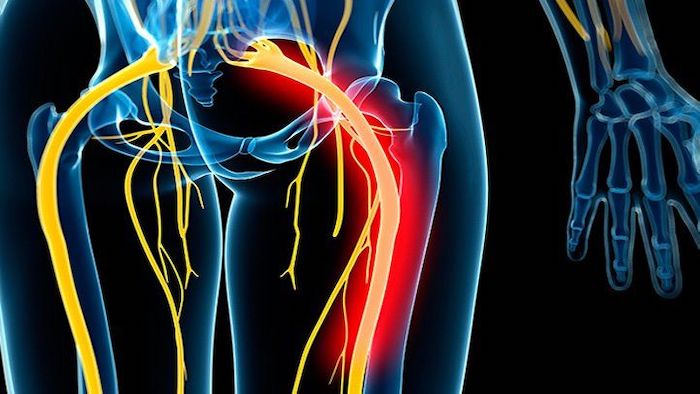
While your sciatica pain can be severe and cause your leg to feel weak, the symptoms typically do not produce any long-term complications. Rarely, if the underlying cause of your sciatica becomes severe, it may produce troubling symptoms when your spinal nerve roots and/or spinal cord get compressed, sometimes triggering a medical emergency.
Below are the descriptions of two serious sciatica symptoms that must be urgently evaluated and treated:
1. Changes in bowel and/or bladder control
Consult your doctor immediately if you have any sudden, unexplained changes in your bowel and/or bladder control. These changes may include:
- An inability to control your bowel and/or bladder movements.
- Difficulty in passing urine, a reduced urinary sensation, a loss of desire to pass urine, or a poor stream.
These symptoms indicate a rare, but serious medical condition called cauda equina syndrome. In addition to incontinence problems, cauda equina syndrome may also cause:
- Sudden pain and weakness in both your legs
- Numbness in your groin, buttocks, genitals, and/or inner thighs (saddle numbness).
- Sexual dysfunction
Cauda equina syndrome can occur suddenly or gradually and typically requires immediate surgery to control the symptoms. If patients with cauda equina syndrome do not receive prompt treatment, it can result in difficulty in walking and/or other neurological problems, including lower-body paralysis. Doctors advise treating this condition within 24 to 48 hours of symptom occurrence in order to preserve lower limb function.
While rare, sciatica caused due to severe disc herniation(s) in the lower spine may progress into cauda equina syndrome.
2. Worsening neurological symptoms
Severe damage to your sciatic nerve roots can cause progressive neurological symptoms and requires immediate treatment. The symptoms may affect one or both legs and typically include the following:
- Numbness
- Weakness
- Tingling
- Abnormal sensations, such as crawling
- An abnormally increased sensitivity to pain (hyperalgesia)
It is also possible for the symptoms to occur only below the knee without involving the entire limb. While these symptoms may not warrant surgery, some form of immediate medical treatment is usually needed. Your doctor may recommend pain management procedures, such as epidural steroid injections or radiofrequency ablation. If your symptoms are severe, do not improve with these treatments, and/or continue to worsen, surgery may be advocated.
Failure to treat severe or progressive neurological symptoms can cause irreversible nerve damage over time. These symptoms may also indicate slow-onset cauda equina syndrome and must not be ignored.
More red-flag symptoms to watch out for
You should also consult a doctor if your sciatica symptoms:
- Started after an accident or injury
- Are accompanied by fever, nausea, and/or loss of appetite
- Include unrelenting night pain or pain at rest
These symptoms may indicate serious medical conditions such as an infection or spinal tumor.
Talk to your doctor if you have troubling symptoms related to sciatica. A doctor can accurately diagnose the underlying cause and recommend a specific treatment plan for your symptoms.
Precision Pain Care and Rehabilitation has two convenient locations in Richmond Hill – Queens and New Hyde Park – Long Island. Call the Richmond Hill office at (718) 215-1888, or (516) 419-4480 for the Long Island office, to arrange an appointment with our Interventional Pain Management Specialist, Dr. Jeffrey Chacko.













